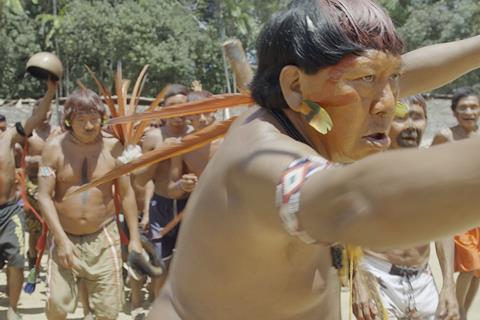Singular, uncompromising documentary details the threat posed to the Indigenous tribes of Brazil

Dirs. Eryk Rocha and Gabriela Carneiro da Cunha. Brazil, Italy. 2024. 110mins.
Eryk Rocha and Gabriela Carneiro da Cunha’s immersive documentary opens with an unbroken seven-minute shot in which, framed by the mountainous terrain, a Brazilian tribe of men, women and children march towards the lens over a dirt trail. As they come closer into view, their dogs, backpacks, bows, spears and shotguns become more visible — and their singing grows louder. Eventually they come so close to the camera that they take over the frame, their presence wholly enveloping the viewer. The Falling Sky thrives on these unflinching stares from a community dedicated to a heritage presently under threat.
A revealing and frustrating experience
Premiering in Directors’ Fortnight, the keenly observational, slow-burning political desires of The Falling Sky makes it appealing for socially conscious audiences. Inspired by the book of the same name by Yanomami shaman Davi Kopenawa (who appears in the film) and French anthropologist Bruce Albert, what’s billed as a collaboration between the Yanomami and Watoriki communities is a revealing and frustrating experience – one that recalls The Territory (2022), another Brazilian documentary about a tribe combating encroaching industrialists. Technically immaculate and marked by sensorial storytelling, it’s also a film whose undeniable style can overwork the simple message it wants to tell.
The film’s arresting title derives from a local apocalyptic myth of the sky literally falling, and the xapiri spirits who not only hoisted it back but are still holding it today. It’s up to the shamans to speak to them. To honour the passing of his father-in-law, who died one year earlier, shaman Davi Kopenawa holds a Reahu feast. But there’s an even graver air hanging over this commemoration. The shamans are also hoping they can call on these spirits to drive back the miners who are deforesting the land
Smartly, Rocha and Cunha never cut away from the Indigenous perspective to get a view of the oncoming industrialists. Instead, the filmmakers look to the environment — polluted water, caustic smoke, the sounds of planes flying overhead — that has begun to creep into the bucolic setting.
For these Indigenous people, this is not new. At one point, one of the shamans decries the various colonial forces — from the United States, Spain, Portugal, Japan and France — who, at various points in Brazil’s history, have tried to seize the land. The shamans also talk about land that was taken away in 1973 to build highways. And yet, through the film’s piercing mix of sound and Watoriki music, which paints a rich picture of the battle between tradition and modernity raging in the very wind that surrounds them, you get the sense that this new challenge is indeed their gravest battle.
The gravity of the situation iis also felt in the long takes employed by editor Renato Vallone. Capturing the tribe’s rituals – dancing, face painting, food making – is as much about visually holding onto these sights before they permanently disappear as it is about giving these Indigenous people space to tell their own story. The tribe also communicates with surrounding communities by VHF radios. Sometimes these conversations are mundane; at other points, they track fast-moving disasters, such as cases of malaria and widespread pneumonia caused by the deteriorating environment.
For all its thematic heft, however, The Falling Sky’s effectiveness is often blunted by its overwhelming style. Towards the end of the film, Rocha and Cunha cut to grey-scaled footage of natural disasters: earthquakes, flooding, the falling glaciers. But such montages have become clichéd. In such a thoughtfully conceived film, the technique feels even more trite. Additionally, the fine line between deliberate pacing and being ponderously inert is sometimes blurred as the filmmakers try to balance explaining the crisis and capturing this way of life, in the process causing each thread to dangle.
This, nevertheless, is an uncompromising film, one that does not bend into didacticism. You could easily imagine a version of this documentary that handholds the viewer, either by making white encroachers a physical and visual presence or by delivering reams of captioned information. But Rocha and Cunha aren’t trying to give viewers such comfort. Rather they’re asking audiences to see, hear and feel the world from the vantage point of the Yanomami and Watoriki people. Such undaunted filmmaking, even when drawn out, renders The Falling Sky as urgent as its title demands.
Production companies: Aruac Filmes, Stemal Entertainment, Rai Cinema, Les Films d’ici
International sales: Rediance info@rediancefilms.com
Producers: Eryk Rocha, Gabriela Carneiro da Cunha, Donatella Palermo
Screenplay: Eryk Rocha, Gabriela Carneiro da Cunha
Cinematography: Eryk Rocha, Bernard Machado
Editing: Renato Vallone
Music: Watoriki Community























